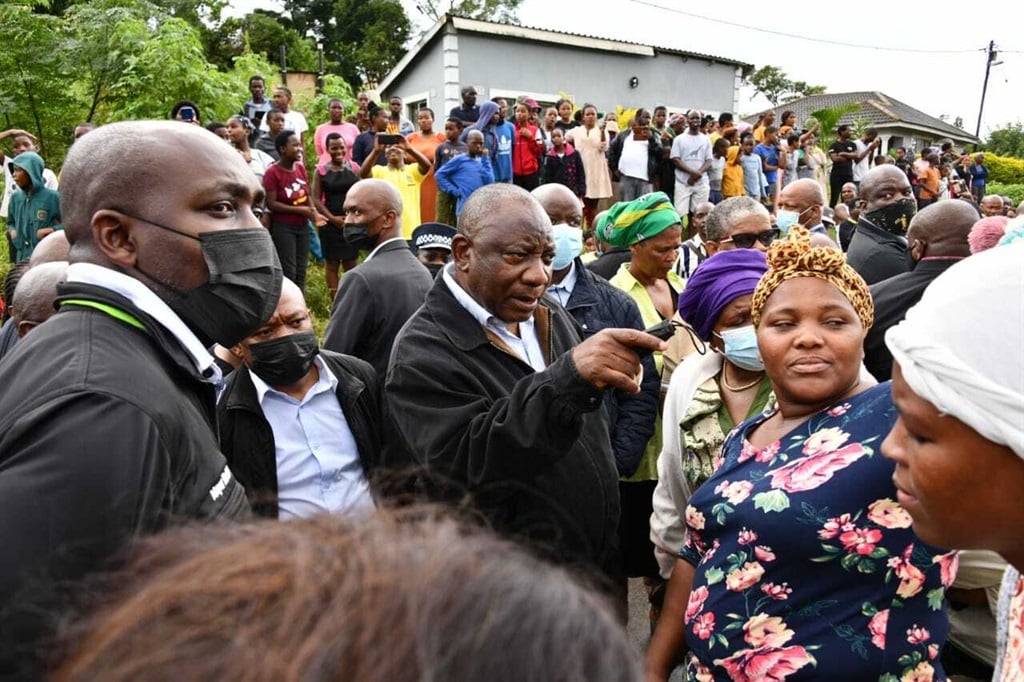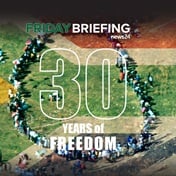
The perception that government is either unwilling to help or to prevent funds meant for KZN flood victims from being misused by corrupt entities is an indictment on our democracy, writes Mikhail Moosa.
It is a national shame that public confidence in the government has been washed away by years of neglect.
When President Cyril Ramaphosa announced that the national government had made R1 billion of emergency funding available for disaster relief in KwaZulu-Natal after calamitous flood damage, many people responded with cynicism rather than approval.
The perception that government is either unwilling to help or to prevent the funds from being misused by corrupt entities is an indictment on our democracy.
If people do not believe that their state can provide emergency assistance effectively, it enables an environment where citizens are isolated from their representatives, where laws are neither abided nor enforced.
But is there really so little trust between citizens and the state? In South Africa's long history of domination and exclusion, hasn't this always been the case?
Public trust is an essential indicator of the state of our politics and the future of our resilience to further climactic shocks.
Public opinion data
The 2021 South African Reconciliation Barometer, a nationally representative survey conducted by the Institute for Justice and Reconciliation, shows that most South Africans do not have confidence in many public institutions. Only a small minority of respondents have a high degree of confidence in the national or provincial government.
The Afrobarometer survey offers the best examination of public trust in South Africa over the past two decades. A recent analysis supports the findings of the Reconciliation Barometer, showing that most South Africans do not trust their representatives. But the survey also reveals that for a period in the early 2000s, a majority of South Africans did trust the government and elected officials.
READ | Corruption 'worsening' during Ramaphosa's tenure - survey
Despite our history of separation and conflict, in the first decade and a half of democracy, there was widespread public support for the government. Undoubtedly, many people were hopeful for what democracy might bring. But during this period, the economy was expanding, and levels of poverty and unemployment, although high by global comparisons, were lower than today.
The Afrobarometer data shows that citizens' trust in their state is dynamic and responsive to political developments. Trust can be earned through relatively good governance and promises of a better life for all, but it can also be lost by economic decline and successive years of high-profile scandals.
What went wrong?
There is a bitter irony to the recent cynicism around relief funds. Ramaphosa's campaign to win the ANC presidency in 2017 pitted the illusion of a "good ANC", an honest and benevolent party that negotiated South Africa's democracy, against a slightly more visceral "bad ANC", a typical postcolonial ruling party that prioritised self-enrichment over their poor supporters.
Fast forward five years, and only the most optimistic, or perhaps credulous, observer would be able to distinguish between the innocent and the blighted factions. To many, Ramaphosa's "new dawn" seems like a false dawn.
READ | Mandy Wiener: We expect officials to steal flood disaster relief funds. We've been here before
The personal protective equipment (PPE) scandal during the first Covid-19 lockdown in 2020 was the most recent brazen example of state money moving into private and politically connected hands. Both the Minister of Health and the President's spokesperson have been implicated in profiting from emergency funding.
To be sure, corruption is not unique to South Africa. In the UK, the former Health Minister was alleged to have ensured that his local pub landlord benefitted from the PPE bonanza, while the police have fined Prime Minister Boris Johnson and his most senior minister for contravening their own lockdown regulations.
But in times of crisis, equivocating is futile. Citizens should be able to trust that when their representatives promise financial support, it is not simply an opportunity for others to profit.
Natural and unnatural disasters
It would be no exaggeration to suggest that part of the reason for the devastation of the flooding has been decades of poor service delivery, crumbling infrastructure and poverty in many areas of KZN. Unusually heavy rainfall is a feature of many climates, but not all floods are so disastrous.
"The crucial point about understanding why disasters happen is that it is not only natural events that cause them," writes Ben Wisner and his colleagues in their influential book, At Risk: Natural Hazards, People's Vulnerability and Disasters. "They are also the product of social, political and economic environments."
The natural disaster was the intense rainfall that subsumed parts of KZN. The unnatural disaster was that so many people live in such vulnerable and precarious circumstances, where homes made from scrap materials can be washed away, where roads are shoddy and neglected, and where the state cannot be trusted to intervene effectively and immediately.
READ | OPINION: Dewald van Niekerk - Blaming nature for the KZN floods is avoiding taking responsibility
While the South African National Defence Force (SANDF) has committed 10 000 troops to assist with relief efforts, only 400 have been deployed so far. The capacity of the airforce to assist in rescue efforts has been depleted by budget cuts and mismanagement. Man-made mismanagement is compounding a natural crisis.
Climactic shocks are common around the world, but it is the resilience of the unnatural environment - housing, infrastructure, government capacity - that turns a natural shock into a natural disaster.
The effects of climate change are already being felt around the world, and South Africa is particularly vulnerable to its most severe consequences. Earlier this month, the World Weather Attribution initiative, a collection of scientists assessing the role of climate change in natural disasters, confirmed that two of the three cyclones that devastated southern Africa earlier this year were exacerbated by heavier rainfall due to climate change.
Tragically, the natural environment will become more unpredictable and hazardous due to climate change. The past month has shown that South Africa is painfully vulnerable to climactic shocks.
But we can alter the course of our unnatural environment, ensuring that it is more cohesive, more resilient, and more trusting.
- Mikhail Moosa is the Project Leader for the SA Reconciliation Barometer at the Institute for Justice and Reconciliation.
Disclaimer: News24 encourages freedom of speech and the expression of diverse views. The views of columnists published on News24 are therefore their own and do not necessarily represent the views of News24.




 Publications
Publications
 Partners
Partners
























